 |
ADOPTION OF THE DRAFT UNITED
NATIONS DECLARATION ON THE RIGHTS OF INDIGENOUS PEOPLES
This controversial Draft Declaration has
been under debate by States and the Indigenous People's caucus for
several years in the UN Working Group on Indigenous Populations in
Geneva and in the Working Group on the Draft Declaration.
Indigenous Peoples would like the Declaration, to be adopted
without any changes as a standard setting instrument to be respected
by all peoples and all nations. |
|
|
|

THE S ISSUE
Who are Indigenous PeopleS? In whose interests are the definitions?
Self-definition
Mililani B. Trask
Kiaaina of Ka Lahui Hawaii
Self-determination
Mark. C. Charfauros
Chamorro Nation |
|
|

ARTICLE 3: UNITED NATIONS DRAFT DECLARATION ON THE RIGHTS OF
INDIGENOUS PEOPLES
A focus on Article 3 on the issue of self-determination and Indigenous
Peoples as rightsholders and full participants in the world community. |
 |
-
TIME IMMEMORIAL
The ancestors are alive and their vision lives through us.
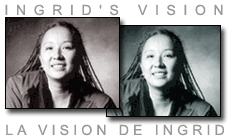
This program is a memorial to the
vision of Ingrid Washinawatok, a prominent Native American who was
murdered in Colombia in 1999. Her vision and work in the international
arena on Indigenous concerns sets the stage for understanding the
creation of the United Nations Permanent Forum on Indigenous Issues.
-
Ingrid Washinawatok El-Issa and the Fourth Mind
-
Flying Eagle Woman
Reflections on Peace
-
Ali El-Issa
-
Honouring Ingrid
-
Tribute - Ingrid's Vision
-
Permanent Forum for Indigenous Peoples
-
Exclusion
December 10, 1992
Indigenous
Leaders Address the General Assembly
|
|
|
|
|

International Law and Human Rights. Relationships of Indigenous
Peoples with the United Nations, its agencies, and other international
organizations, showcasing the innovative work of the UN Permanent
Forum on Indigenous Issues.
2012
LISTEN TO
DAILY AUDIO BROADCASTS OF THE
ELEVENTH SESSION OF THE UN PERMANENT FORUM
DIALOGUE BETWEEN NATIONS
ONLINE BROADCASTS
 FIRST WEEK
FIRST WEEK
 SECOND WEEK
SECOND WEEK
OFFICIAL WEBSITE
ELEVENTH SESSION
of the United Nations permanent Forum on Indigenous Issues
7-18 May 2012
UN Headquarters, New York
2011
LISTEN TO DAILY AUDIO BROADCASTS OF THE
10th SESSION OF THE UN PERMANENT FORUM
DIALOGUE BETWEEN NATIONS
ONLINE BROADCASTS
 FIRST WEEK
FIRST WEEK
 SECOND WEEK
SECOND WEEK
TENTH SESSION
of the United Nations Permanent Forum on Indigenous Issues
16-27 May 2011
UN Headquarters, New York
2010
Ninth Session
Permanent Forum on Indigenous Issues
UN Headquarters,
New York
19 - 30 April, 2010
Special Theme:
Indigenous peoples: development with culture and identity;
articles 3 and 32 of the United Nations Declaration on the Rights of
Indigenous Peoples
MEDIA COVERAGE
LISTEN TO DAILY AUDIO BROADCASTS OF THE
9th SESSION OF THE UN PERMANENT FORUM
DIALOGUE BETWEEN NATIONS
ONLINE BROADCASTS
 FIRST WEEK
FIRST WEEK
 SECOND WEEK
SECOND WEEK
2009
Eighth Session
Permanent Forum on Indigenous Issues
UN Headquarters,
New York
18 - 29 May, 2009
MEDIA COVERAGE
LISTEN TO DAILY AUDIO BROADCASTS OF THE
8TH SESSION OF THE UN PERMANENT FORUM
DIALOGUE BETWEEN NATIONS
ONLINE BROADCASTS
 FIRST WEEK
FIRST WEEK
 SECOND WEEK
SECOND WEEK
|
2006 |
Fifth Session
United Nations
Permanent Forum on Indigenous Issues
Special Theme:
The Millennium Development Goals and indigenous peoples:
Re-defining the Millennium Development Goals
United Nations
Headquarters, New York
15 to 26 May 2006 |
|
2005 |
Fourth Session
United Nations Permanent Forum on Indigenous Issues
Special Theme:
Millennium Development Goals and Indigenous Peoples
with a focus on Goal 1 to Eradicate Poverty and Extreme
Hunger,
and Goal 2 to achieve universal primary education
United Nations
Headquarters, New York
16 to 27 May 2005 |

World Conference Against Racism
The issues of marginalization, economic development,
prosperity, governance and democracy are brought together in an
interweaving of programming based upon two distinct streams of
content: Racism and Strategic Alliances.
RACISM
The UN World Conference Against Racism, in Durban, South Africa,
2001 was a disappointment for the aspirations of the Indigenous
delegations present.
UNITED NATIONS FOURTH WORLD CONFERENCE ON WOMEN
Action for Equality, Development and Peace
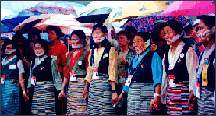
Held in Beijing, China, in 1995, women from around the world gathered to
network, share urgent issues and to adopt the Beijing Declaration and Platform
for Action. Among those present was a delegation of
Tibetan Women
in exile from several countries. Dialogue Between Nations has been invited
to host the Tibetan Women's Delegation Report On the United Nations Fourth World
Conference on Women.
UNIFEM
Working for Women's Empowerment and Gender Equality
COMMISSION ON
THE STATUS OF WOMEN (CSW)
BEIJING DECLARATION OF INDIGENOUS WOMEN
|
 |

ORGANIZATION OF AMERICAN STATES
Dialogue Between Nations also offers Special programming on the
process of dialogue between States and Indigenous representatives of
the Americas at the Organization of American States in Washington,
D.C.
OAS Draft American Declaration
on the Rights of Indigenous Peoples
HISTORY: WHY A DECLARATION
PROPOSED AMERICAN DECLARATION ON
THE RIGHTS OF INDIGENOUS PEOPLES
Approved by the Inter-American Commission on Human Rights
on February 26, 1997, at its 1333rd session, 95th regular session
WORKING DOCUMENT
COMPARING THE PROPOSED AMERICAN DECLARATION
ON THE RIGHTS OF INDIGENOUS PEOPLES
(approved by the IACHR in March, 1997)
AND THE PROPOSALS MADE BY STATES
AND INDIGENOUS REPRESENTATIVES
AT OAS MEETINGS IN 1999
12 January 2001
Dialogue 2001
Special Meeting of the Working Group
to prepare the Draft American Declaration
on the Rights of Indigenous Peoples
Dialogue 2002
Special Meeting of the Working Group
to prepare the Draft American Declaration
on the Rights of Indigenous Peoples
Dialogue 2003
Special Meeting of the Working Group
to prepare the Draft American Declaration
on the Rights of Indigenous Peoples
Meeting Concerning Negotiations
With Indigenous Representatives
and States on the Draft Declaration at the OAS
November, 2003
CONSOLIDATED TEXT OF THE DRAFT DECLARATION
PREPARED BY THE CHAIR OF THE WORKING GROUP
June 2003
INTERACTIVE VERSION
of the
CONSOLIDATED TEXT 2003
Organization of American
States
Permanent Council of the Organization of American States Committee
on Juridical and Political Affairs
Working Group to Prepare the Draft American Declaration
on the Rights of Indigenous Peoples
Journey to the Summit
Indigenous Peoples and the Third Summit of the Americas
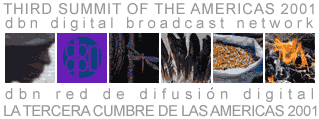
The Third Summit of the Americas, in Quebec City, also in 2001,
provided an opportunity for Matthew Coon Come, National Director,
Assembly of First Nations of Canada, to bring the documentation of the
Indigenous Peoples Summit of the Americas to the attention of member
states of the OAS.
Official Summit programs and topics are explored in depth in
interviews with special guests from two concurrent locations, the
Morris J. Wosk Centre for Dialogue, Simon Fraser University, in
Vancouver, Canada hosted by Haida lawyer Woodrow Morrison and the
International Media Centre in Quebec City, during the Summit,
co-hosted by Kenneth Deer, Mohawk, and publisher of the Eastern Door
newspaper and Oscar Gonzales, Director, Mexican Academy of Human
Rights. |
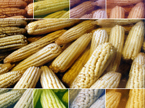 |
INTERNATIONAL RELATIONSHIPS
You cannot separate environment and development
from human rights
Analysis and strategy building through dialogue and participatory
action research (PAR) on 32 thematic issues which can support case
studies of current concern will soon be available as an interactive
component of our special program features in this stream of content
topics.
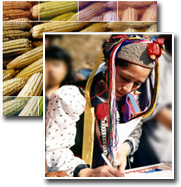
From Kari-Oca to Kimberley
We reaffirm the vital role of the Indigenous
Peoples in sustainable development
Reafirmamos que los
Pueblos Indígenas
tienen un papel vital en el desarrollo sostenible
Over the past ten years,
Indigenous representatives from around the world have lobbied for
their rights at United Nations mega-conferences such as the UN Earth
Summit (UN Conference on Environment and Development) in Brazil in
1992 and the Johannesburg World Summit on Sustainable Development in
2002. This programming focuses on the Declarations created in the
pre-conferences of Indigenous Peoples in Kari-Oca, Brazil (1992) and
Kimberley, South Africa (2002) and the initiatives of the Indigenous
caucus in the context of the development of concrete global policies.
We will be providing links to Indigenous Peoples Declarations and
agendas at the most recent conferences and Summits, leading to the
COP15 United Nations Climate Change Conference, Copenhagen 2009.
UNITED NATIONS
CLIMATE CHANGE CONFERENCE
Copenhagen, Denmark
December 7 to 18, 2009
INDIGENOUS PEOPLES' GLOBAL SUMMIT ON CLIMATE CHANGE
Anchorage, Alaska
April 20 - 24, 2009
ANCHORAGE DECLARATION
In 4 Official Languages (pdf formats)
TEBTEBBA
Tebtebba (Indigenous Peoples' International Centre for Policy
Research and Education)
is an indigenous peoples' organization born out of the need for
heightened advocacy
to have the rights of indigenous peoples recognized, respected and
protected worldwide.
Visit their web site for detailed information on Indigenous People's
presence
at international forums, Summits and additional Declarations
KARI-OCA
Kari-Oca Revisited
Kari-Oca Introduction
Kari-Oca Press Release, June, 1992
Kari-Oca Communications Events
Kari-Oca Declaration and Indigenous People's Earth Charter
Introduction
Preamble to the Declaration
Kari-Oca Declaration
Kari-Oca Indigenous People's Earth Charter
Kari-Oca Indigenous People's Earth Charter - Interactive Version
Kari-Oca at UNCED
KIMBERLEY
Kimberley Introduction
The Kimberley Declaration
Indigenous Peoples' Plan of Implementation on
Sustainable Development
Yusuf Ali on Assignment in South Africa
Special Reports
TEBTEBBA FOUNDATION
WORLD TRADE ORGANIZATION - SEATTLE SUMMIT
The Impact of the WTO on Indigenous Peoples
The Issue of Biopiracy
Vandana Shiva
India |



 |
DIALOGUES
Dialogue in Wendat, English, Aymara and Spanish
A global exchange: read or listen to the voices of Indigenous leaders,
lawyers, Elders, and other role models, as well as their
non-Indigenous counterparts, through audio and video clips recorded
over the past ten years at conferences and international gatherings on
several continents.
This pilot program features dialogue excerpts from a larger
documentary program currently in post-production. These testimonies
from Konrad Sioui, an Indigenous leader from Canada and Bolivian
Elder, Antonio Espinoza Huayllas, were recorded during a spontaneous
encounter at the UN World Conference on Environment and Development in
Rio, Brazil, 1992.
|
|
 |
CREATING
A CULTURE OF CONFIDENCE THROUGH DIALOGUE
Strategies for Recognition of Indigenous PeopleS within the context of
Human Security, the Situation of Fundamental Freedoms and Human
Rights, and the Vital Role of Indigenous Peoples in evolving community
and global agendas Kinship With One Another |
 |
ROLL CALL OF NATIONS
PROGRAMMING IN DEVELOPMENT
This is who I am. This is where I live. Knowledge building: a data
base of Indigenous individuals who appear in pre-recorded dialogues,
their landscapes, their Nations |
|
